Are bananas good for IBS? If your school-aged child has been diagnosed with irritable bowel syndrome (IBS), then you’ve probably read inconsistent advice about bananas.
If you are not sure whether your child should be eating bananas, then you are going to want to read this article.
We’ll briefly cover what’s paediatric IBS or irritable bowel syndrome and whether bananas are good or bad for constipation, loose stools and IBS-related symptoms.
What’s IBS?
IBS stands for irritable bowel syndrome.
It has been recently reclassified as a disorder of the gut-brain interaction rather than a functional gastrointestinal disorder.
Not surprisingly, the main IBS symptoms are constipation, diarrhoea or a mix of both.
Children may also complain about an ongoing tummy ache, bloating and gas.
These IBS symptoms can also present with other symptoms like:
- Mucus in stools
- The urgency to open bowels
- Poop accidents
- Nausea or vomiting
- The sensation of incomplete emptying after opening their bowels
If your child struggles with tummy troubles, as a parent you might be wondering are bananas good for IBS and whether they trigger a change in their stool pattern.
Are bananas good for IBS?
After trying the initial dietary modifications in my Get Kids Pooping Painfree course, some children may be recommended to try the low FODMAP diet.
The low FODMAP diet was first introduced by Monash University, down under in Australia.
It’s an acronym for fermentable oligosaccharides, disaccharides, monosaccharides and polyol (FODMAP) diet.
The Monash team regularly analyse the level of these fermentable carbohydrates in food.
It’s important to understand the level of FODMAPs in foods that can trigger IBS symptoms in children and adults.
The good news? When it comes to bananas, the Monash team have confirmed that a simple yellow or firm banana is considered to be low FODMAP.
This means that your child can enjoy a serving of a medium-sized firm yellow banana daily, even if they struggle with IBS related constipation or loose stools.
What is a low fodmap banana?
The level of ripeness of a banana determines its FODMAP rating. Unripe bananas have a low fodmap rating.
A low fodmap banana is one serving of a green or medium-sized firm yellow banana.
As bananas ripen the level of their fermentable carbohydrates called fructans increases.
A ripe banana is when you can see that its skin is dotted with black spots.
Ripe bananas contain fructans.
Fructan is a type of fermentable carbohydrate that can trigger IBS symptoms in some children diagnosed with IBS.
This is because the gut can have difficulty fully digesting fructans found in overripe bananas.
However, not all children will find that ripe bananas trigger a change in their stool pattern.
It’s therefore important to understand your child’s individual and unique IBS food triggers so that their diet is not restricted unnecessarily.
If you don’t know your child’s specific food triggers, your GP can refer you to a paediatric dietitian who specialises in irritable bowel syndrome.
Alternatively, you can look for a MONASH-certified paediatric dietitian like myself.
If you prefer to avoid long waiting lists, you can work with me 1-2-1 inside my IBS Kids Mastery Method Programme.
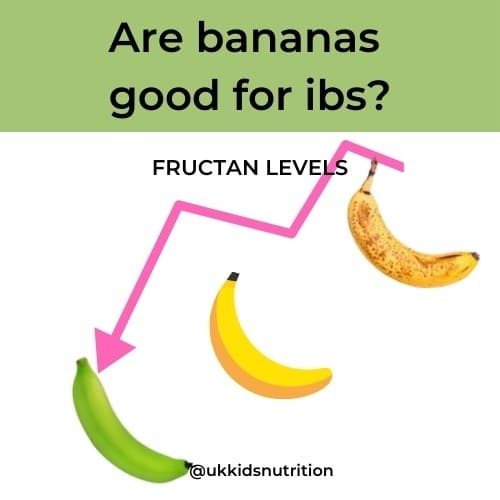
Are green bananas low fodmap?
Green bananas are indeed a low fodmap food and rich in a type of fibre called resistant starch.
Resistant starch behaves like soluble fibre.
It travels undigested to the large intestine where it ferments and releases short-chain fatty acids.
An important short-chain fatty acid produced is called butyrate.
The short-chain fatty acids like butyrate feed the good bacteria in the gut helping it to nurture its microbial diversity.
It also helps increase the bacterial numbers residing in the gut.
Butyrate has been linked with various health benefits including reducing inflammation in the body.
But if your child refuses to eat green bananas, don’t worry.
You can still source other foods rich in fermentable fibre.
Examples of other food rich in fermentable fibre include:
Remember that children can still enjoy a serving of a firm yellow banana without triggering diarrhoea or constipation regardless of whether they have been diagnosed with irritable bowel syndrome or not.
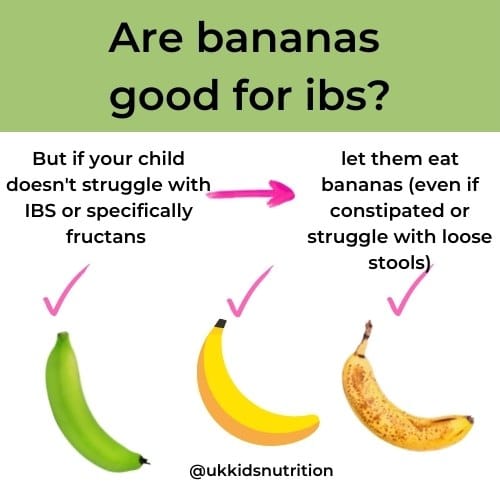
What about baking with ripe bananas?
Maybe your kid is also following an egg-free diet and you regularly use bananas in baking as a binder.
Or you just love banana bread as a family.
No problem.
The good news is that if you usually use a few bananas in your banana bread recipe, the final amount of ripe bananas per serving isn’t high enough to trigger loose stools or constipation.
So your child doesn’t need to give up their slice of banana bread.
What are good fodmap alternatives to banana?
If you prefer that your child avoids bananas for a short period of time this is still okay.
You can monitor your child’s symptoms using my IBS Stool and Symptom Checker that you’ll find in my Healthy Essentials Poop Bundle.
You can offer fodmap alternatives to bananas.
Fodmap alternatives to bananas are:
- Berries
- Melon
- kiwifruit
- clementine
- oranges
Can unripe bananas cause diarrhoea?
Unripe bananas are a low fodmap food. Low fodmap bananas like unripe bananas are unlikely to trigger a change in your child’s stools.
If you are unsure which foods are triggering your child’s loose stools or constipation, monitor their IBS symptoms using my IBS Symptom Checker Diary.
It’s part of a bundle inside my Healthy Essentials Poop Bundle.
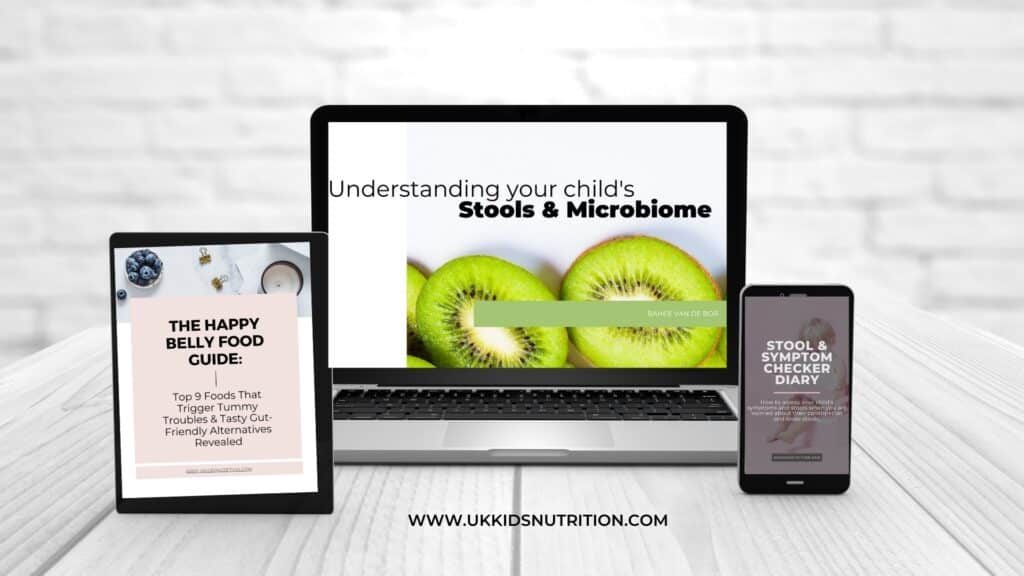
What if my child struggles with constipation without IBS?
Great question! FODMAP-rich foods are also nutrient-dense providing vitamins and minerals, antioxidants and fibre.
The fibre in plant foods is particularly important to help relieve constipation in children.
It’s also an excellent food to feed the beneficial bacteria in the gut.
Bananas for example are in fact a gut-loving food as it is a source of fibre.
There’s approximately 2.6g of dietary fibre per 100g of banana.
Bananas are rich in soluble fibre which can help soften stools and make them easier to pass.
This type of bulking fibre absorbs water so that stools are soft, viscous and pain free.
This means that bananas shouldn’t be unnecessarily cut out of children’s diets as their fibre source can be beneficial for their overall gut health.
So if your child struggles with constipation (and hasn’t been diagnosed with IBS), there is no need to avoid bananas.
But as it is a nutritious food with fibre, potassium and other nutrients, firm yellow bananas are good for IBS too!
Are bananas good for IBS constipation?
Bananas are hugely popular among children.
They are easy to transport and store and naturally taste sweet.
It also has a pleasantly smooth texture which means that most children will accept it without a fuss.
Despite this, many articles might have you believe that bananas are one of the worst foods for IBS.
Nothing could be far from the truth!
Monash University has confirmed that firm and ripe yellow bananas are a low fodmap food.
It’s, therefore, good food for IBS, which means that it shouldn’t be one of the foods to avoid with IBS.
Even if you consider the level of ripeness of bananas, for many children, bananas are unlikely to be one of the IBS trigger foods.
If your child struggles with constipation, a serving of bananas a day can actually help soften their stools so it’s much easier to pass.
However, if you are concerned that your child has underlying irritable bowel syndrome and you would like to understand common trigger foods for IBS, consider joining my 1-2-1 IBS Kids Mastery Method Programme.
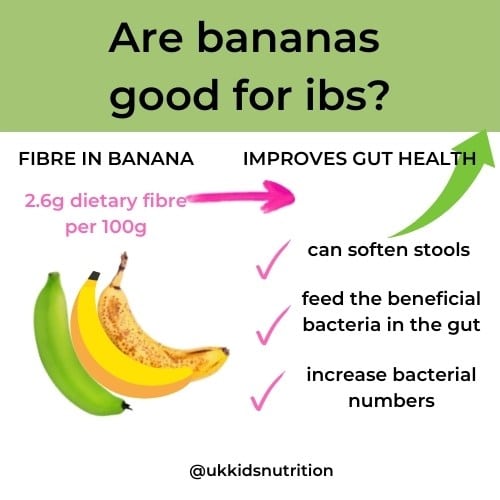
Bottomline
So, are bananas good for IBS? Depending on how you look at it, bananas are a source of fibre that feed the friendly bacteria in the gut. So that means that bananas are good for IBS! If your child has been diagnosed with IBS, then stick to a low fodmap serving like a firm yellow banana or choose green bananas.
If you bake with ripe bananas, the amount of ripe bananas per slice of banana cake is small. So there is no need to avoid baking with bananas.
Bananas and IBS might appear confusing, but you now know that once you understand your child’s unique food triggers, you can make informed decisions about whether to include or cut back on bananas from your child’s diet.
Remember to monitor your child’s IBS symptoms using my IBS Symptom Checker Diary so that you are only limiting foods that trigger IBS symptoms for your child.
Let Me Help
Is your child struggling with constipation, bloating or loose stools?
Then either one of my programmes below will help.


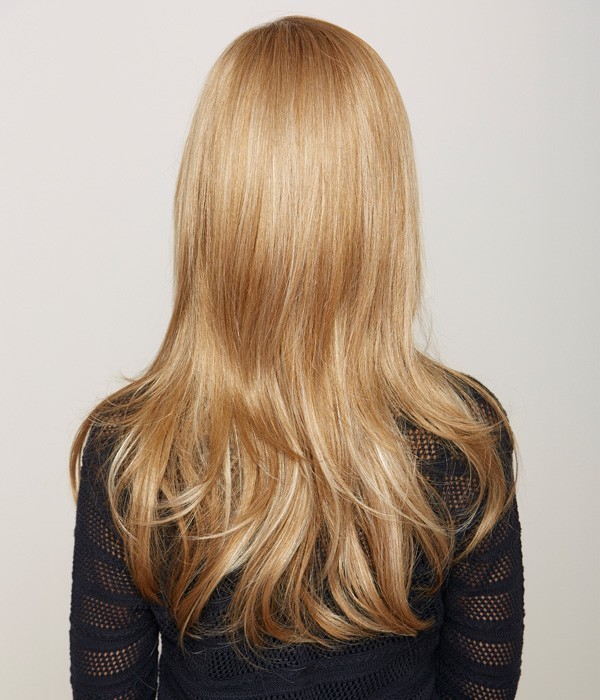

/assets/images/provider/photos/2672875.jpg)

More Stories
Censorship and Health Propaganda: The Hidden Dangers
Can You Trust Government Health Agencies Anymore?
Eating Disorders Information Every Family Should Read